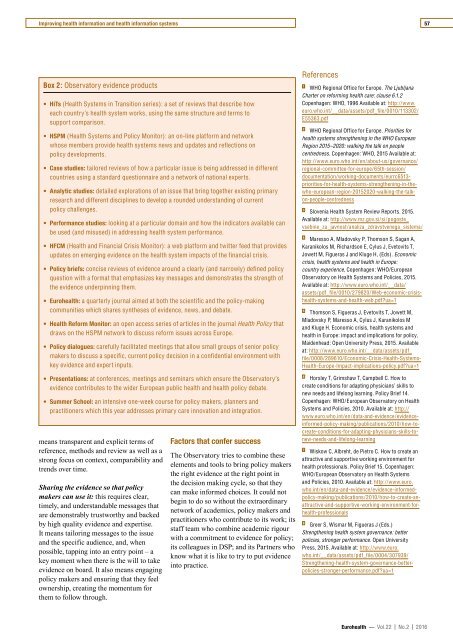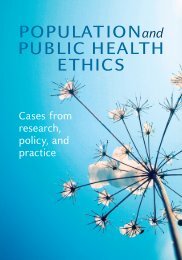EUROHEALTH
Eurohealth-volume22-number2-2016
Eurohealth-volume22-number2-2016
You also want an ePaper? Increase the reach of your titles
YUMPU automatically turns print PDFs into web optimized ePapers that Google loves.
Improving health information and health information systems<br />
57<br />
Box 2: Observatory evidence products<br />
• HiTs (Health Systems in Transition series): a set of reviews that describe how<br />
each country’s health system works, using the same structure and terms to<br />
support comparison.<br />
• HSPM (Health Systems and Policy Monitor): an on-line platform and network<br />
whose members provide health systems news and updates and reflections on<br />
policy developments.<br />
• Case studies: tailored reviews of how a particular issue is being addressed in different<br />
countries using a standard questionnaire and a network of national experts.<br />
• Analytic studies: detailed explorations of an issue that bring together existing primary<br />
research and different disciplines to develop a rounded understanding of current<br />
policy challenges.<br />
• Performance studies: looking at a particular domain and how the indicators available can<br />
be used (and misused) in addressing health system performance.<br />
• HFCM (Health and Financial Crisis Monitor): a web platform and twitter feed that provides<br />
updates on emerging evidence on the health system impacts of the financial crisis.<br />
• Policy briefs: concise reviews of evidence around a clearly (and narrowly) defined policy<br />
question with a format that emphasizes key messages and demonstrates the strength of<br />
the evidence underpinning them.<br />
• Eurohealth: a quarterly journal aimed at both the scientific and the policy-making<br />
communities which shares syntheses of evidence, news, and debate.<br />
• Health Reform Monitor: an open access series of articles in the journal Health Policy that<br />
draws on the HSPM network to discuss reform issues across Europe.<br />
• Policy dialogues: carefully facilitated meetings that allow small groups of senior policy<br />
makers to discuss a specific, current policy decision in a confidential environment with<br />
key evidence and expert inputs.<br />
• Presentations: at conferences, meetings and seminars which ensure the Observatory’s<br />
evidence contributes to the wider European public health and health policy debate.<br />
• Summer School: an intensive one-week course for policy makers, planners and<br />
practitioners which this year addresses primary care innovation and integration.<br />
means transparent and explicit terms of<br />
reference, methods and review as well as a<br />
strong focus on context, comparability and<br />
trends over time.<br />
Sharing the evidence so that policy<br />
makers can use it: this requires clear,<br />
timely, and understandable messages that<br />
are demonstrably trustworthy and backed<br />
by high quality evidence and expertise.<br />
It means tailoring messages to the issue<br />
and the specific audience, and, when<br />
possible, tapping into an entry point – a<br />
key moment when there is the will to take<br />
evidence on board. It also means engaging<br />
policy makers and ensuring that they feel<br />
ownership, creating the momentum for<br />
them to follow through.<br />
Factors that confer success<br />
The Observatory tries to combine these<br />
elements and tools to bring policy makers<br />
the right evidence at the right point in<br />
the decision making cycle, so that they<br />
can make informed choices. It could not<br />
begin to do so without the extraordinary<br />
network of academics, policy makers and<br />
practitioners who contribute to its work; its<br />
staff team who combine academic rigour<br />
with a commitment to evidence for policy;<br />
its colleagues in DSP; and its Partners who<br />
know what it is like to try to put evidence<br />
into practice.<br />
References<br />
1<br />
WHO Regional Office for Europe. The Ljubljana<br />
Charter on reforming health care: clause 6.1.2<br />
Copenhagen: WHO, 1996 Available at: http://www.<br />
euro.who.int/__data/assets/pdf_file/0010/113302/<br />
E55363.pdf<br />
2<br />
WHO Regional Office for Europe. Priorities for<br />
health systems strengthening in the WHO European<br />
Region 2015–2020: walking the talk on people<br />
centredness. Copenhagen: WHO, 2015 Available at:<br />
http://www.euro.who.int/en/about-us/governance/<br />
regional-committee-for-europe/65th-session/<br />
documentation/working-documents/eurrc6513-<br />
priorities-for-health-systems-strengthening-in-thewho-european-region-20152020-walking-the-talkon-people-centredness<br />
3<br />
Slovenia Health System Review Reports. 2015.<br />
Available at: http://www.mz.gov.si/si/pogoste_<br />
vsebine_za_javnost/analiza_zdravstvenega_sistema/<br />
4<br />
Maresso A, Mladovsky P, Thomson S, Sagan A,<br />
Karanikolos M, Richardson E, Cylus J, Evetovits T,<br />
Jowett M, Figueras J and Kluge H, (Eds). Economic<br />
crisis, health systems and health in Europe:<br />
country experience, Copenhagen: WHO/European<br />
Observatory on Health Systems and Policies, 2015.<br />
Available at: http://www.euro.who.int/__data/<br />
assets/pdf_file/0010/279820/Web-economic-crisishealth-systems-and-health-web.pdf?ua=1<br />
5<br />
Thomson S, Figueras J, Evetovits T, Jowett M,<br />
Mladovsky P, Maresso A, Cylus J, Karanikolos M<br />
and Kluge H. Economic crisis, health systems and<br />
health in Europe: impact and implications for policy,<br />
Maidenhead: Open University Press, 2015. Available<br />
at: http://www.euro.who.int/__data/assets/pdf_<br />
file/0008/289610/Economic-Crisis-Health-Systems-<br />
Health-Europe-Impact-implications-policy.pdf?ua=1<br />
6<br />
Horsley T, Grimshaw T, Campbell C. How to<br />
create conditions for adapting physicians’ skills to<br />
new needs and lifelong learning. Policy Brief 14.<br />
Copenhagen: WHO/European Observatory on Health<br />
Systems and Policies, 2010. Available at: http://<br />
www.euro.who.int/en/data-and-evidence/evidenceinformed-policy-making/publications/2010/how-tocreate-conditions-for-adapting-physicians-skills-tonew-needs-and-lifelong-learning<br />
7<br />
Wiskow C, Albreht, de Pietro C. How to create an<br />
attractive and supportive working environment for<br />
health professionals. Policy Brief 15. Copenhagen:<br />
WHO/European Observatory on Health Systems<br />
and Policies, 2010. Available at: http://www.euro.<br />
who.int/en/data-and-evidence/evidence-informedpolicy-making/publications/2010/how-to-create-anattractive-and-supportive-working-environment-forhealth-professionals<br />
8<br />
Greer S, Wismar M, Figueras J (Eds.)<br />
Strengthening health system governance: better<br />
policies, stronger performance. Open University<br />
Press, 2015. Available at: http://www.euro.<br />
who.int/__data/assets/pdf_file/0004/307939/<br />
Strengthening-health-system-governance-betterpolicies-stronger-performance.pdf?ua=1<br />
Eurohealth — Vol.22 | No.2 | 2016
















